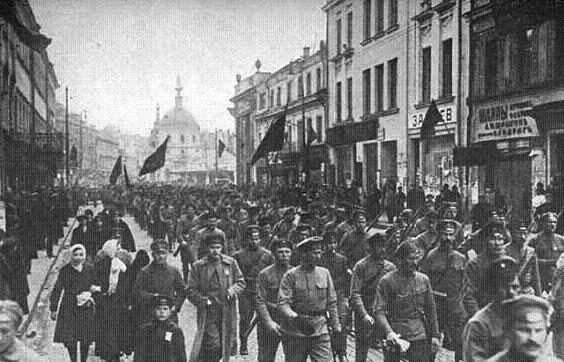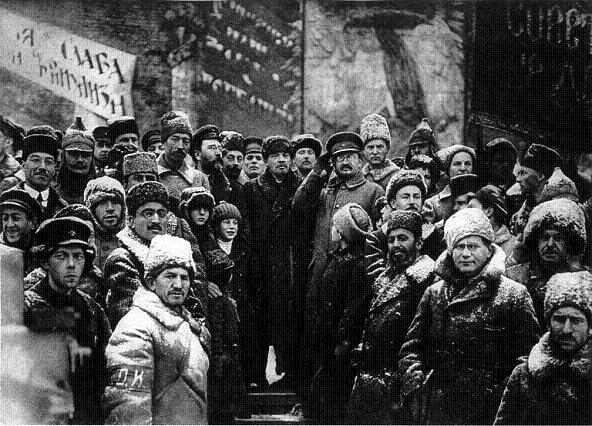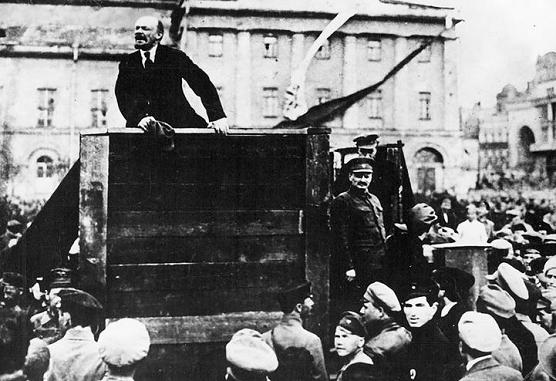1. First of all, we believe that the October socialist revolution will not have taken place in Russia without Lenin. Lenin was in fact in opposition to the central committee of the Bolshevik party during the February and October 1917 revolutions. The Bolshevik faction and the Bolshevik party founded from 1903 to 1917 was simply not up to the task of fomenting the revolution from February to October. Lenin opposed the indecisiveness and vacillation of almost the entire Bolshevik Party's central committee to launch the insurrection and seize power in October.
2. In the midst of the Party leadership’s wavering, Lenin was very clear even before October 1917, as pointed out by him in a pivotal document called "The April Theses," on the socialist character of the revolution as against the prevailing view that the revolution can only be bourgeois-democratic.
3. The main line of the theses was "All Power to the Soviets", a call for the revolution of the masses. It was a call to the working class to seize state power from the hands of the bourgeoisie, and later on, the petty-bourgeois leadership of the Provisional Government under Kerensky, a Right-wing Menshevik. The call means ending the dual power that existed between the Provisional Government and the Soviet power organized by the working class, the peasants and the revolutionary soldiers at that period. The call highlighted the profoundly democratic character of the October revolution.
4. Lenin also explained the insurrectionary character of the revolution. Lenin mentioned three conditions that had to exist to ensure the victory of insurrection. This is what Lenin wrote to the Central Committee of the Bolshevik Party a few weeks before the October Revolution ("A Letter to the Central Committee of the R.S.D.L.P. (B.)," written September 13-14, 1917):
"To be successful, insurrection must rely, not upon conspiracy and not upon a party, but upon an advanced class. That is the first point. Insurrection must rely upon a revolutionary upsurge of the people. That is the second point. Insurrection must rely upon that turning-point in the history of the growing revolution when the activity of the advanced ranks of the people is at its height, and when the vacillations in the ranks of the enemy and in the ranks of the weak, half-hearted and irresolute friends of the revolution are strongest. That is the third point. These three conditions for raising the question of insurrection distinguish Marxism from Blanquism. Once these conditions exist, however, to refuse to treat insurrection as an art is a betrayal of Marxism and the revolution."
5. For Lenin, the revolution was not a coup d’état as other historians would like to refer to the October Revolution because the take-over of the Winter Palace was relatively peaceful, where not a single shot was fired. But the October revolution was preceded by the February revolution, and before that, the 1905 revolution. These were series of uprisings where millions of people – workers, soldiers and peasants – mobilized and thousands sacrificed their lives in the battle against tsarism and the backward capitalist system. On the other hand, a coup d’état has always been the means to replace one elite faction of the ruling class with another elite faction. The working class, however, does not only aim for a regime change, but a change of the social system – the social revolution and its true content.
6. These three conditions for a successful insurrection can also serve as a guide to those who want to oust the current Duterte regime and those who really aim for social revolution. The Yellow forces might be aiming for a coup d’état scenario, but we are not. On the other hand, the call of Duterte’s minions for the imposition of a Duterte-led revolutionary government does not also involve a change in the social system. It is just another version of martial law imposition in the country that Duterte has been wanting to do for quite some time now.
Leninism = Stalinism?
1. There are those who view that the Bolshevik revolution under Lenin merely paved the way for Stalinism, for the bureaucratization of the revolution that led to state totalitarianism and the eventual collapse of socialism in the Soviet Union and in Eastern Europe in 1989 onwards. (There are also those who do not see Stalinism as a major problem, as the former is 70% correct and only 30% wrong according to them.)
2. It is not a question of the “original sin” that paved the way for countless number of sins and evils in the “socialism” that existed then. Instead, we need a historical materialist understanding of Stalinism, the objective factors and the system of responses of the communist parties and governments that contributed to the degeneration of the socialist revolution and later on, the collapse of the first socialist project in history, or what is now called the "really-existing socialism.” Nothing compares to the analysis put forward by Leon Trotsky on the degeneration of the October revolution in his incisive and pioneering work "The Revolution Betrayed". Trotsky was a comrade of Lenin, a left Menshevik leader who turned Bolshevik, a pioneer of the Soviet system, and a courageous leader of the Soviet Red Army before he was exiled from the Soviet Union in 1929 and bludgeoned to death by Stalin’s spy in 1940.
3. Trotsky said in "The Revolution Betrayed":
"The proletarian character of the October revolution was determined by the world situation and by a special correlation of internal forces. But the classes themselves were formed in the barbarous circumstances of tsarism and backward capitalism, and were anything but made to order for the demands of a socialist revolution. The exact opposite is true. It is for the very reason that a proletariat still backward in many respects achieved in the space of a few months the unprecedented leap from a semi-feudal monarchy to a socialist dictatorship, that the reaction in its ranks was inevitable. This reaction has developed in a series of consecutive waves.
4. The external conditions and events that blocked the advance of the October revolution consisted of the intervention of various capitalist powers, the lack of direct support from the working class movements in European countries, and the failure of the expected Europe-wide workers’ uprisings which would advance socialism in many countries. Although the Bolsheviks quickly gained state power, the long civil war took its toll among the people. Many revolutionary leaders died in the civil war, while some of those who rose in power became careerist bureaucrats and broke away from the masses."
5. For Trotsky, the demobilization of the Red Army of more than five million forces is one of the main reasons for the formation of the bureaucracy. The victorious Red Army commanders assumed leading posts in the local Soviets, or in the various posts in the government and in the economy, and introduced strict measures that were used during the civil war. Thus, on all sides the masses were pushed away gradually from actual participation in the leadership of the country.
6. With the need to revive the economy amidst the attacks and blockades of the capitalist countries, the Soviet leadership took a backward step by introducing NEP or the New Economic Policy where the petty bourgeoisie and the technocrats became the main economic pillars in the country. The bureaucracy, which first emerged as representatives of the working class, had become an arbiter of the interests of various classes existing under the NEP – mostly the petty bourgeoisie and the small capitalists or entrepreneurs.
7. The international situation worked against the advantage of the Bolshevik revolution. The revolutions led by the working class in Europe and Asia were defeated. Trotsky mentioned the following events that spanned until the 1920s: "The crushing of the Bulgarian insurrection in 1924, the treacherous liquidation of the General Strike in England and the unworthy conduct of the Polish workers' party at the installation of Pilsudski in 1926, the terrible massacre of the Chinese revolution in 1927, and, finally, the… defeats [of the working class revolutions] in Germany and Austria. These, according to Trotsky are the “historic catastrophes that killed the faith of the Soviet masses in world revolution, and permitted the bureaucracy to rise higher and higher as the sole light of salvation."
8. In his work "The Revolution Betrayed", Trotsky pointed to the degeneration of the socialist revolution due to the problem of bureaucratism which deformed the working class state. Eventually, this bureaucratism would abolish the workers’ state itself and deliver it to the hands of the new bureaucracy.
Mistakes of the Bolshevik Party
1. The Bolsheviks were trying to figure out how to correctly address the problems posed by the limitations of the objective conditions during the October revolution. But mistakes were made that need to be acknowledged and studied more closely.
2. Ernest Mandel said in his work "October 1917: Coup d’état or social revolution":
"In general, the October Revolution was the product of objective social contradictions, which acquire an irrepressible explosive dynamic, as well as the evolution of the relationship of forces between the classes and the social layers operating in this framework…
This said, in the light of the later evolution of the Russia of soviets and of the USSR, we should ask whether some of the policies put into operation by the Bolshevik party, after the taking of power, did not encourage the process of bureaucratic degeneration of the first workers' state."
3. For Mandel, the most serious of these mistakes was the banning of the socialist factions or “soviet parties” (which included the Socialist Revolutionaries and the Mensheviks) at the very moment that the revolutionary government had definitively won the civil war of 1918-20. Trotsky wrote in 1936 that [the] “prohibition of factions ended in a prohibition to think otherwise than the infallible leaders. The police-manufactured monolithism of the party resulted in a bureaucratic impunity which has become the source of all kinds of wantonness and corruption.” In the Transitional Programme that he wrote in 1938, Trotsky came out explicitly in favor of multi-partyism: “Democratization of the soviets is impossible without legalization of soviet parties. The workers and peasants themselves by their own free vote will indicate what parties they recognize as soviet parties."
4. Lenin argued that the banning of the soviet parties, as well as the banning of factions within the government party, was undoubtedly seen as temporary measures, related to particular circumstances , which would therefore be repealed when the objective situation improved. But the banning of opposition parties of the working classes, and the monolithic character of the socialist and communist parties, became the norm ever since.
5. Lenin was more acutely aware of the problems that unraveled early on, much more than Trotsky or any other Bolshevik leaders. Lenin was already incapacitated in 1922 when he began to dictate his views on the “last struggle” against the distortions and problems faced by the Bolsheviks at that time: the problem of bureaucratic degeneration of the workers’ state, and the policies and thinking related to the national question. Lenin told Trotsky that the problem of bureaucratism had become “something monstrous” when he came back to work after the first attack of illness. Lenin’s criticism of Stalin’s handling of the situation in Georgia, where the Georgian Communists’ desire for independence had clashed with the harsh centralizing policy of Stalin, was contained in his document “The Question of Nationalities” where he referred to Stalin as “that really Russian man, the Great-Russian chauvinist, in substance a rascal and a tyrant, such as the typical Russian bureaucrat is.”
6. In December 1922, Lenin dictated a note to his secretary on his sick bed – later on referred to as “Lenin’s Testament” – where he said that he was against the continuation of Stalin’s role in the central committee as the powerful general secretary as Stalin “has concentrated too much power in his hands,” and he is “not sure he’ll be always capable of using that authority with sufficient caution.” At that time, Lenin was even preparing for the eventuality of a split within the Bolshevik party because of the worsening differences and diverging views on situation and policies.
7. Mandel enthused that Lenin’s greatness lies not so much in his victories, as in the way that his life ended, or in the fight that he put up under the conditions of his final illness. This only proves, according to Mandel, how genuine was Lenin’s concern for democracy.
21st Century Socialism
1. We are retracing the history of the October Revolution and its aftermath. It is important that we understand the historical materialist basis of the degeneration of the socialist project in the 20th century, its lessons and the imperfections and errors that need to be rectified in today’s socialist movement.
2. Even though the immediate successors of the Bolshevik revolution have fallen, socialism has come back with a vengeance in many countries in Latin America, and presumably in the Philippines today under the newly-reorganized Laban ng Masa which takes on socialism as the direction of its struggle.
3. However, socialism today is being waged under different circumstances and conditions.
4. Capitalism has progressed to its most degenerate stage – the period of neoliberalism. It has resulted in a worsening economic crisis and the worst social inequality the world has witnessed over the past century. Many capitalist countries even suffer the gradual de-industrialization of their economies. The number of factory-based industrial workers is shrinking and being replaced by a large number of contractual service workers being called the precariat. The number of unemployed is growing which has resulted in the dramatic explosion of urban poor and rural poor communities in the last decades.
5. According to Noam Chomsky, two major threats to the world today have immediate and urgent impact that we cannot afford to procrastinate on dealing with them today. Even before the emancipation of humanity against oppression and inequality, and the dawn of socialism around the world, the planet is in danger of extinction from two cataclysmic events. One is the threat of ecological disaster under the constant and wanton destruction of the environment and severe climate change. Second, the threat of nuclear war, especially now that many countries are competing with the use of nuclear weapons to destroy one another. There’s a disproportionate number of nuclear weapons favoring the United States which adopts a first strike option to any country it deems to threaten its nuclear superiority, such as China or the small North Korean nation. For Chomsky, it is a miracle that the US has not hit the nuclear button to obliterate its rivals. With Donald Trump as the new US president, this irrational and crazy antic cannot be ruled out.
6. In view of these, socialism must be pursued with emphasis on resolving the environmental problem and ending of the nuclear threat, the never-ending war and the annihilation of the entire planet. In short, a 21st century socialism with utmost environmental agenda and a thoroughgoing anti-imperialist, anti-war concern. The urgency of these problems means the urgency of replacing the capitalist system with a system that can solve them. The need for a socialist revolution is as urgent as ever.
7. Latin America is leading the advancement of socialism in the 21st century. Socialism is now promoted as the alternative system by many movements and governments in Venezuela, Bolivia, Cuba, and others, under the new conditions and contexts. Cuba is a prime example of a socialist state that has defied the errors of the “really-existing socialism” and has managed to implement a socialism that avoids a bureaucratic caste and has put the working people’s interests first before anything else. The socialist-led governments in Latin America today are facing the difficulties of constructing a socialist system under an existing bourgeois capitalist state. This explains the need to set up alternative system of political power, such as the grassroots Communal Councils in every working class and poor communities in Venezuela.
8. The socialism of the 21st century reaffirms the importance of class struggle and the leading role of the working class in liberating society. Included among the working class is the broad and increasing ranks of the urban poor and the so-called “informal sectors” of society (the non-industrial sectors). The broad ranks of the urban poor and the informal sectors are a more recent phenomenon brought about the decline and decay of the capitalist system. Those constituting the working class stake their fate to the termination of the barbaric capitalist system and the establishment of a free socialist society.
9. The question of a revolutionary Bolshevik type of party is still of paramount importance, although there have been critiques of party vanguardism in a number of groups and formations. Lately, the term being used is “political instrument” of the revolutionary classes, which could take the form of party, coalition or united fronts.
10. There are many more issues we would like to take up in our renewal of socialism today. We will have many opportunities to discuss and debate on this. Partido Lakas ng Masa (PLM) is opening our November 28 Manila Socialism Conference for a discussion among organizations and leaders of Laban ng Masa. We offer it as a continuation of the discussion of our separate views on socialism and the relationship of our transitional program under the Platform of the Masses to the end-goal of building socialism in the country.
By Sonny Melencio & Reihana Mohideen
Party of the Laboring Masses (PLM) - Philippines
Partido Lakas ng Masa (PLM)
http://www.masa.ph/





